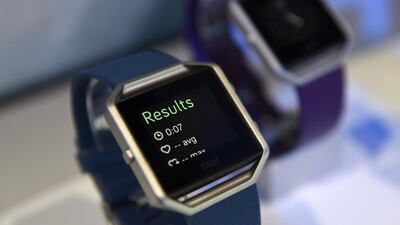World Health Day, on Friday, will focus on depression – also known as “black dog” (an expression attributed to Sir Winston Churchill but probably much older). At a global level, over 300 million people are estimated to suffer from depression – equivalent to 4.4 per cent of the population. According to the World Health Organisation, the prevalence of depressive disorders in the Gulf Cooperation Council countries ranges from 4.5 to 5.1 per cent of population. Yet, it can be prevented and treated.
Digital health care can make a difference to a condition such as depression.
The capacity for data and data analytics to predict the future is very powerful and has genuine benefits. For example, depression can lead to suicide, which is now the second leading cause of death among 15- to 29-year olds. Collecting and analysing data can help identify those young patients who may be most at risk and vulnerable.
According to the World Health Organisation, depression affects people of all ages, from all walks of life, in all countries. It causes mental anguish and affects people’s ability to carry out even the simplest everyday tasks, with sometimes devastating consequences for relationships with family and friends, and the ability to earn a living.
With personalised medicine, accelerating research and development, and savings for our healthcare systems, big data promises big things to help shape the future of health. Between 2012 and 2050, the volume of health data is likely to increase 50-fold, according to the American Medical Informatics Association.
This acceleration of R&D through big data raises some interesting prospects in terms of intervention, giving rise to a new discipline: predictive medicine. For example, in collaboration with Inserm, Temis Group is leading a clinical study to prevent suicide risks in people with depression, by compiling statistics on medicinal treatments, travel habits and conversations on social media, to identify the most vulnerable.
This exponential growth is “organic” in nature since it largely comes from medical practices and patients themselves, thanks to personal connected technology and the digitisation of medical records. The number of connected devices in the world – watches, scales, pedometers, blood-pressure monitors – is predicted to rise to 25 billion in 2020.
Stored by different participants in the health system – doctors, laboratories, hospitals – and protected by medical confidentiality, data can only ever be used with the patient’s permission, and even then only after having been “anonymised”. The volume of health data is increasing exponentially, but the patients’ private information is being made inaccessible or useless.
The “new data ” coming from connected devices is also scattered in different places, stored by private companies, while remaining, for the time being, the user’s property.
How can we link up the data held by a mobile app with a file stored at a hospital? How can we sort between a piece of well-being data and a medically relevant statistic? And how can we ensure that health data is used in a way that doesn’t infringe patient privacy for commercial gain? These are among the many questions that are holding up data projects.
Big data offers enormous potential for the future of health care and the promise of more effective medicine because it can be personalised. Based on the diagnosis and the data that we have available about the patient, it is possible to establish a more precise idea of the most appropriate medication for that individual. But the road towards developing the tools and making the regulatory framework as open and secure as possible is still a long one.
Laurent Marini is managing director, Saudi Arabia, Oman and Bahrain, of Orange Business Services

